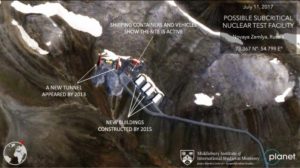May 30, 2019
May 30, 2019: Yesterday, a senior US official with the Defense Intelligence Agency stated that Russia is “probably” not adhering to its commitment under the 1996 Comprehensive Nuclear-Test-Ban Treaty (CTBT), citing questionable activity at Russia’s Novaya Zemlya test site.
The open-source analysts at the James Martin Center for Nonproliferation Studies who monitor the Novaya Zemlya site have not detected any alarming activity. “Two years ago, we identified construction of a new facility at Novaya Zemlya that is probably for subcritical testing,” said East Asia Program Director Jeffrey Lewis. “It’s similar to the subcritical testing facility the United States built at Nevada.”
Subcritical testing is not covered by the CTBT. “The treaty bans all nuclear-explosive testing,” explains Senior Program Manager Jean du Preez, a former senior official with the CTBT Organization. “It is purposefully silent on subcritical testing, in order for the United States to have continued its Stockpile Stewardship Program that would allow US nuclear-weapon labs to test the reliability and safety of the US stockpile.”
Eurasia Program Director Sarah Bidgood suspects—absent credible new evidence that Russia is conducting low-yield tests—the US official rehashed this issue “in order to support the narrative that Russia is an unreliable partner in arms control, with whom verification does not work.” She continued to say that, “This is the same narrative put forward by the circumstances surrounding US withdrawal from the 1987 Intermediate-range Nuclear Forces Treaty and lays the groundwork for the US not to pursue the extension of the 2010 New START or any follow-on arms-control agreement with Russia.”
“If the United States is truly worried about low-yield testing,” adds Lewis, “it should pursue reciprocal transparency measures on these two sites.”
Contact
- For more information on our open-source analysis, contact:Jeffrey Lewis
831.647.6616
[email protected] - For more information on Russia and the bilateral relationship, contact:Sarah Bidgood
831.647.3584
[email protected] - For more information on the CTBT, contact:Jean du Preez
831.647.6575
[email protected] - For more information on the science behind nuclear testing, contact:Ferenc Dalnoki-Veress
831.647.4638
[email protected]

